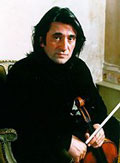|
|
|
[INDEX]
The London Philharmonic Orchestra rolled into Carnegie Hall on its American
tour for two programs on Oct. 7 and Oct. 8, 2002. The London Philharmonic
Orchestra is not to be confused with the more prestigious and refined
London Symphony Orchestra (a similar confusion exists between the superb
Vienna Philharmonic Orchestra and the more pedestrian Vienna Symphony
Orchestra). The London Philharmonic Orchestra is a serviceable group which
plays in the pit at the Glyndebourne Opera in the summer, makes numerous
soundtrack recordings, and prides itself on educational outreach work.
 Carnegie
Hall was almost full for the Oct. 7 concert (the only one I attended).
The audience was packed with friends, family and fans of Russian violist
Yuri Bashmet (photo left) who played the Walton Viola Concerto, no doubt
a nod to the centenary of Walton’s birth this year. Bashmet is reputedly
one of the world’s great violists, yet his playing on this occasion was
unremarkable. While commanding a full tone and complete technical command
of his instrument, his reading suffered from an apparent unfamiliarity
with the concerto in question. His eyes were glued to the score on the
stand in front of him in what looked and sounded like sight reading. This
despite the fact that Bashmet and the London Philharmonic Orchestra played
the same program three days earlier in Philadelphia. Carnegie
Hall was almost full for the Oct. 7 concert (the only one I attended).
The audience was packed with friends, family and fans of Russian violist
Yuri Bashmet (photo left) who played the Walton Viola Concerto, no doubt
a nod to the centenary of Walton’s birth this year. Bashmet is reputedly
one of the world’s great violists, yet his playing on this occasion was
unremarkable. While commanding a full tone and complete technical command
of his instrument, his reading suffered from an apparent unfamiliarity
with the concerto in question. His eyes were glued to the score on the
stand in front of him in what looked and sounded like sight reading. This
despite the fact that Bashmet and the London Philharmonic Orchestra played
the same program three days earlier in Philadelphia.
The concert opened with Prokofiev’s Symphony No. 5 (1944), a wartime opus
composed for Koussevitsky and the Boston Symphony Orchestra. It is not
one of Prokofiev’s more inspired works and under the leaden baton of Kurt
Masur it sounded like a potboiler, comparing unfavorably to the thrilling
works Shostakovich was composing around the same time. Masur, despite
being the London Philharmonic Orchestra’s principal conductor, seemed
to have little rapport with the orchestra. Interpretation was limited
to cueing entries and adjusting the volume. Prokofiev’s music needed an
energizing hand to chisel surfaces, galvanize rhythms, and inject vigor.
Instead it got ineffectual poking and prodding.
The final piece on the program was Richard Strauss’s Till Eulenspiegel.
This chestnut was at least familiar, and the programmatic musical hijinks
came as a relief. Still, it was merely an average performance, with a
sour horn.
The London Philharmonic Orchestra’s 2002 tour includes Philadelphia, Washington,
Boston, and Newark. Their Chicago gig was cancelled, which is no loss
to the Windy City, home of the superior Chicago Symphony. The Philadelphia
Inquirer critic panned the Oct. 4 performance of the same program I heard,
complaining of “routine playing” and other shortcomings (“The character
of the orchestra? It's not the most virtuosic, it does not have the greatest
sound, and [...] it did not achieve the kind of close ensemble that is
instinct to the world's best orchestras.”) Critics in other cities seemed
more pleased with the London Philharmonic Orchestra’s second program -
Beethoven’s Symphony 1 and Bruckner Symphony 7.
> Carnegie Hall
[INDEX]

|
|
|


